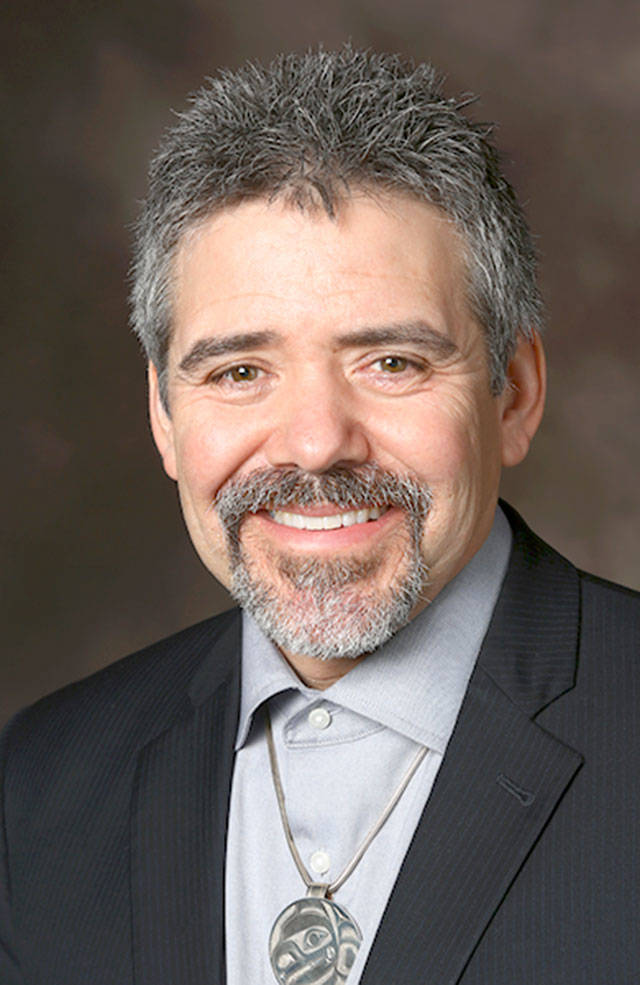By Kurt Grinnell
Jamestown S’Klallam Tribe
With all of the recent publicity about net pens, we feel compelled to weigh-in.
Net pens are a technique for growing fish — a technique that has at times been done well, and at other times been done poorly.
We are not inherently opposed to net pens.
We are opposed to growing a non-native species in our waters.
It is the non-native Atlantic salmon, not net pens, which pose a threat to our treaty resources.
The Jamestown S’Klallam Tribe has thrived since time immemorial on the abundance of sea life living in our usual and accustomed waters, and we have acted as stewards of those environments in order to preserve our lifeways, our culture and our food sources.
Retaining our rights to harvest fin and shellfish was one of the key provisions of the Treaty of Point No Point that we negotiated with the federal government in 1855 — rights that have been reaffirmed in several court cases, including the Boldt and Rafeedie decisions.
The abundance of fish that once provided for us is no longer available naturally.
Since the early 1900s, propagating native fin and shellfish from larvae has been a successful method for augmenting natural populations in our area as conditions (including loss of habitat and commercial over-harvesting) have changed.
Tribes, Washington state and private parties have all turned to aquaculture to augment populations and harvest.
In some cases, this includes the use of net pens to grow fin fish until they are strong enough to survive in the wild.
We are not alone in our love of fish, nor are we alone in our belief in aquaculture.
Peoples all over the world love seafood, and seafood has been shown to be an important component of a healthy human diet.
Much of the fish eaten worldwide is farmed.
The question is whether we want to import fish from countries where farmed seafood is unregulated, or whether we want to do our due diligence and use the best that science and technology have to offer in order to grow fish safely and sustainably in our own country.
All food production impacts the environment.
The key is understanding and mitigating those impacts in order keep the environment clean and productive.
We believe that growing fin and shellfish safely and sustainably is possible, and as good stewards of our lands and waters, that is what we are doing and intend to continue doing.
In fact, we are on the cutting edge of the aquaculture industry.
Jamestown Seafood’s Point Whitney Ventures LLC is spawning and growing oyster and geoduck seed and seeding the Sequim Bay tidelands for harvest.
This work is possible because of the restoration work that we did more than 10 years ago in the Jimmycomelately Creek and Estuary.
In lower Dungeness and Dungeness Bay, we have been working for decades with Clallam County and Clallam Conservation District to improve water quality.
We have achieved significant improvements, with hundreds of acres having a shellfish harvest classification upgrade.
We understand that all life is connected.
That is why our Natural Resources staff take a holistic approach to all of their work.
We research and monitor the impacts of all that we do to assure that we do no harm to the environment as we pursue methods of producing the fin and shellfish that are a part of our Salish culture.
For example, we monitor water quality and quantity in terms of such issues as storm water, algae blooms, ocean acidification, impacts of septic systems, irrigation and wells. And then we act on what we find, to clean up and sustain healthy ecosystems.
Most recently, we have begun a pilot project on farmed black cod (also known as sablefish or butterfish).
Working with the National Oceanic and Atmospheric Administration (NOAA), National Marine Fisheries Service (NMFS), and the University of Washington at a lab near Manchester, we have spent the past year gaining a better understanding of how to spawn and grow this native species for market.
The once-abundant and highly sought-after species has dwindled in numbers in Puget Sound, and we believe that farming it may provide us with an economically-viable business model in the future.
In order to determine whether this is true, we recently applied for and were awarded a three-year Washington SeaGrant to fund further study.
We intend to explore the pros and cons of many issues related to growing black cod — land-based vs. open-water farming sites; how best to formulate food for this species (as opposed to salmonids); and whether there is a species (like sea cucumber) that we might co-locate beneath the black cod pens that might feed on their detritus and provide us with a second marketable product.
We have already developed a relationship with commercial fishermen in Gig Harbor who helped us bring our first harvest to market, and they were thrilled to have work during their slow season (one of the many benefits of farming fish as opposed to catching them).
We are a 21st century tribe. We believe in economic development and we intend to protect our culture and our treaty rights. We do our due diligence before we commit to any project, always looking to protect the environment while working to become more self-sufficient as a tribal nation.
We urge the public to learn along with us, and to keep an open mind about aquaculture.
Like any technology, it can be done well or poorly.
Like everything else we do, we intend to do aquaculture well, or not to do it at all.
________
Kurt Grinnell is a member of the Jamestown S’Klallam Tribal Council and the chairman of the Jamestown S’Klallam Natural Resources Committee.
